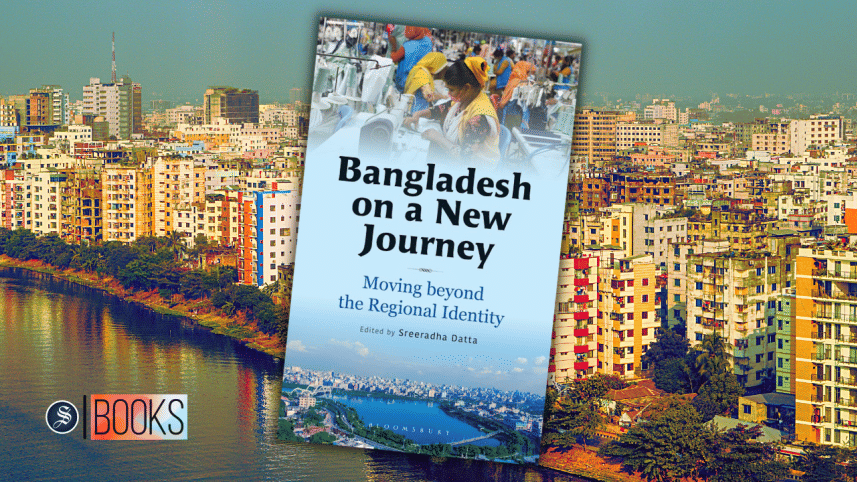Bangladesh beyond geopolitics in a new multipolar world: what’s new in foreign policy trajectory?

Bangladesh's worldview and its foreign policies have been in the scholarly limelight in recent times. This book contains the contributions of 13 Bangladeshi and international scholars, edited by Sreeradha Datta, demonstrating comprehensive postures of Bangladesh's foreign relations with major powers and critical international stakeholders. The transformation in the ontology of the Bangladesh question, as discussed in the editor's notes, is unique in that it acknowledges Bangladesh is no longer a small state; hence, its foreign policies can't be understood as confining into regional geopolitics. One of the major contributions of this book is the recognition of Bangladesh's transitional status. The country's strategic location in South Asia, its large population, its exposure to regional and global strategic vulnerabilities, and climate change present significant challenges. At the same time, Bangladesh also shows a vibrant economic potential, entrepreneurial spirit, and a growing diaspora, offering opportunities for sustainable engagement and collaboration with the international community.
With that being flagged in multiple chapters, the book vividly argues that Bangladesh's foreign policy has continuously been through a dynamic and evolving process, adapting to the transformative global landscapes and aligning the country's own aspirations accordingly. Many chapters (such as Michael Kugelman and Humayun Kabir) provide a meticulous historical account of Bangladesh's challenges and success stories in diplomacy and foreign affairs, which offers great learning opportunities for the readers. The discussions have used multilevel analysis to explain why and how Bangladesh continues to develop and assert its role in 21st century international politics. Other chapters also demonstrate the significance of foreign policy as a critical instrument for safeguarding Bangladesh's national interests, promoting global connectivity and transregional cooperation, and contributing to international peace and security.
The discursive accounts of obstacles are both centripetal and centrifugal in nature. For example, identity issues are very internal and may potentially extend the social fault lines if they remain unaddressed. Both Brigitta Schuchert and Ali Riaz's chapters have focused on national and societal identities and how they have posed challenges for Bangladesh's upcoming policy directions. The discussion broadens the potential of linking secular and global identities of its citizens at home and abroad and its role in pragmatising foreign policy options. Climate change and environmental disasters pose a critical threat to Bangladesh's progress. What diplomatic approaches would be effective in addressing the issues of financial climate vulnerable sectors in the complex multipolar world?
Multipolarity is an epistemological question to understand the contemporary world order and how the particular state manoeuvres the change and continuity of its foreign policy postures. Bangladesh's commitment to "friendship towards all and malice to none", multiple regional platforms, and compliance with international norms and institutions establish Bangladesh's multipolar approach as a constructive and responsible member of the global community. Bangladesh, as identified by Johannes Plagemann and Sreeradha Datta in their respective chapters, has diverted the influence of linear regional geopolitics and its dependency on conventional donors in many capacities. This has helped Bangladesh to improve its relations with neighbours and extra-regional powers by effectively navigating the challenges and embracing the opportunities that lie ahead. Multipolarity is also evident in Bangladesh's internationalisation of the Rohingya issue despite there having been an effort to monopolise the crisis and its solutions by China. Bangladesh's eastern neighbourhood is evolving into further quandary of civil wars and internal strife. In addition to China, Bangladesh's relations with other Southeast Asian partners would prove beneficial. Furthermore, Bangladesh's Western engagement in this case is not only based on the demands of humanitarian support but also reinforces Bangladesh's role as a critical supporter of regional peace and stability. Whatever the outcomes may be, and perhaps it would be a lengthy process to observe a solution, Bangladesh, through multi-level engagements, would be able to strengthen its position as a regional and global player.
The book contains five chapters on Bangladesh's bilateral relations with India, China, Pakistan, the United States, and Australia, respectively. All these chapters have contributed to understanding Bangladesh's international relations at the bilateral levels of analysis and juxtaposed the respective relationships in the context of regional and global contexts. Both the China and India factors in Bangladesh's foreign policy decisions, as identified in Li Jianjun and Deb Mukharji's chapters, will be continuously evolving and contributing factors that would perhaps influence Bangladesh's policies with other countries as well. So far as of now, Bangladesh has been able to generate unique and independent foreign policy positions with regard to these two very important development partners of Bangladesh. Bangladesh-Japan relations, which could have been a chapter-length contribution in this edited volume, deserve the same attention. Nevertheless, Bangladesh may need to be cautiously optimistic to stir its national aspirations and maintain "friendly" reciprocal relations with the countries mentioned here.
The Indian Ocean and the Bay of Bengal are the new hotspots of geopolitics. Sreeradha Datta's chapter on "From the Bay of Bengal to the Indo-Pacific", however, argues how Bangladesh's role as a critically contributing littoral state deconstructed the conventional image of marine geopolitics and stretched the concept of power based on cooperation between the east and the west on various non-traditional—economic and social sectors. The maritime landscape offers multimodal opportunities for connectivity and infrastructural investments to facilitate transregional trade. Hence, it will be a critical lifeline to maintain Bangladesh's growth momentum.
This book concludes with a cautionary note that geopolitical competition is still an existential threat to peace and stability. Bangladesh's economic and strategic prospects and evolving global identity beyond regional narrowness generate political leverages to cater to a pragmatic set of foreign relations with its development partners. Finally, the book contributes illustriously to the fluidity of regional identity and necessitates the decolonisation of foreign policy scholarship by highlighting the uniqueness and significance of the Bangladesh factor to understand its contribution to global progress sustainability.
Niloy Ranjan Biswas is a Professor of International Relations at the University of Dhaka. He writes extensively on global security, peacekeeping & peacebuilding, violent extremism, and forced migration issues.



 For all latest news, follow The Daily Star's Google News channel.
For all latest news, follow The Daily Star's Google News channel. 


Comments